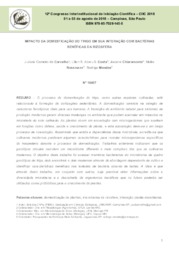Impacto da domesticação do trigo em sua interação com bactérias benéficas da rizosfera.
Impacto da domesticação do trigo em sua interação com bactérias benéficas da rizosfera.
Autoria: CARVALHO, J. C. de; COSTA, L. S. A. S.; CHIARAMONTE, J. B.; ROSSMANN, M.; MENDES, R.
Resumo: Resumo: O processo de domesticação do trigo, como outras espécies cultivadas, está relacionado à formação de civilizações sedentárias. A domesticação consiste na seleção de caracteres fenotípicos úteis para uso humano. A transição do ambiente natural para sistemas de produção modernos geram diversas mudanças no ambiente que podem acarretar em impactos na microbiota do solo cultivado. As plantas vivem em associação com microrganismos que auxiliam em funções como defesa, saúde e crescimento da planta, e esta associação deve-se a um longo processo de coevolução. Assumindo que existe a dependência dessa microbiota, acredita-se que cultivares modernos perderam algumas características para recrutar microrganismos específicos do hospedeiro durante o processo de domesticação. Trabalhos anteriores indicaram que os genótipos crioulos recrutam um microbioma diferente e mais complexo dos que os cultivares modernos. O objetivo deste trabalho foi acessar membros bacterianos do microbioma de quatro genótipos de trigo, dois ancestrais e dois modernos através da abordagem dependente de cultivo e identificar características benéficas nos isolados de bactéria através de testes. A ideia é que através deste trabalho, em conjunto com outros, seja possível obter informações sobre a diversidade microbiana e a descoberta de organismos benéficos que no futuro poderão ser utilizados como probióticos para o crescimento de plantas. Abstract: Wheat?s domestication process, like other cultivated species, is related to the formation of sedentary civilizations. Domestication consists in the selection of useful phenotypic characters for human use. The transition from the natural environment to modern production systems generate s several changes in the environment that can lead to impacts on the microbiota that lives in the cultivated soil. Plants live in association with microorganisms that aid in functions such as defense, health and plant growth, and this association is due to years of coevolution. Assuming that there is dependence between plants and microbiota, it is believed that modern cultivars have lost some traits to recruit host - specific microorganisms during domestication process. Previous work has indicated that wild genotypes recruit a different and more complex microbiome than modern cultivars. The objective of this work was to access bacterial members of the microbiome of four wheat genotypes, two ancestors and two modern through the culture dependent approach and to identify beneficial characteristics in the bacterial isolates through tests. The idea is that through this work, together with others, it will be possible to obtain information on the microbial diversity and the discovery of beneficial organisms that in the future could be used as probiotics for the growth of plants.
Ano de publicação: 2018
Tipo de publicação: Artigo em anais e proceedings
Unidade: Embrapa Meio Ambiente
Observações
1 - Por padrão são exibidas publicações dos últimos 20 anos. Para encontrar publicações mais antigas, configure o filtro ano de publicação, colocando o ano a partir do qual você deseja encontrar publicações. O filtro está na coluna da esquerda na busca acima.
2 - Para ler algumas publicações da Embrapa (apenas as que estão em formato ePub), é necessário ter, no celular ou computador, um desses softwares gratuitos. Sistemas Android: Google Play Livros; IOS: iBooks; Windows e Linux: software Calibre.
Acesse outras publicações
Acesse a Base de Dados da Pesquisa Agropecuária (BDPA) para consultar o acervo completo das bibliotecas da Embrapa.

